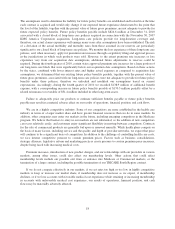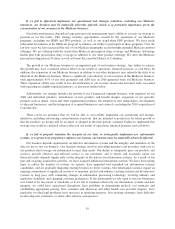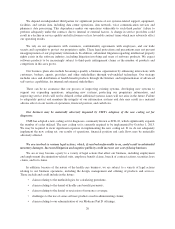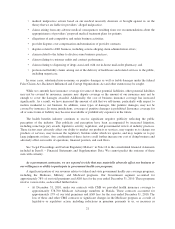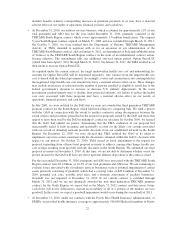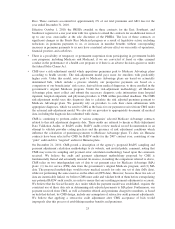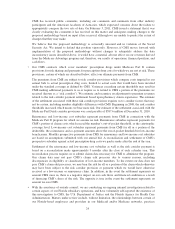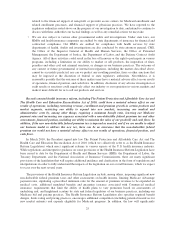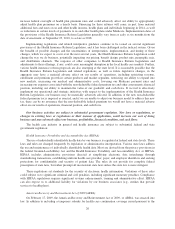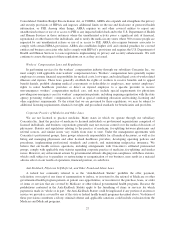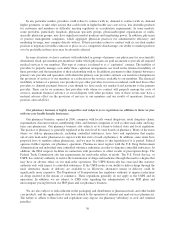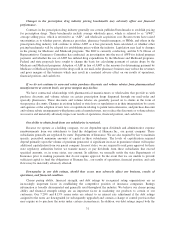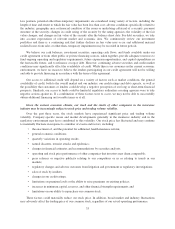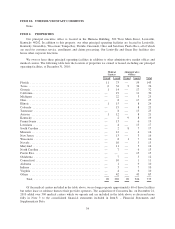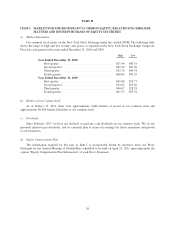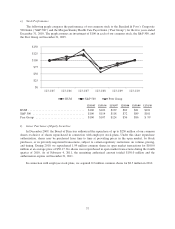Humana 2010 Annual Report Download - page 38
Download and view the complete annual report
Please find page 38 of the 2010 Humana annual report below. You can navigate through the pages in the report by either clicking on the pages listed below, or by using the keyword search tool below to find specific information within the annual report.Section 1877 of the Social Security Act, commonly known as the “Stark Law,” prohibits physicians, subject
to certain exceptions described below, from referring Medicare or Medicaid patients to an entity providing
“designated health services” in which the physician, or an immediate family member, has an ownership or
investment interest or with which the physician, or an immediate family member, has entered into a
compensation arrangement. These prohibitions, contained in the Omnibus Budget Reconciliation Act of 1993,
commonly known as “Stark II,” amended prior federal physician self-referral legislation known as “Stark I” by
expanding the list of designated health services to a total of 11 categories of health services. The professional
groups with which we are affiliated provide one or more of these designated health services. Persons or entities
found to be in violation of the Stark Law are subject to denial of payment for services furnished pursuant to an
improper referral, civil monetary penalties, and exclusion from the Medicare and Medicaid programs.
Many states also have enacted laws similar in scope and purpose to the Anti-Kickback Statute and, in more
limited instances, the Stark Law, that are not limited to services for which Medicare or Medicaid payment is
made. In addition, most states have statutes, regulations, or professional codes that restrict a physician from
accepting various kinds of remuneration in exchange for making referrals. These laws vary from state to state and
have seldom been interpreted by the courts or regulatory agencies. In states that have enacted these statutes, we
believe that regulatory authorities and state courts interpreting these statutes may regard federal law under the
Anti-Kickback Statute and the Stark Law as persuasive.
We believe that our operations comply with the Anti-Kickback Statute, the Stark Law, and similar federal or
state laws addressing fraud and abuse. These laws are subject to modification and changes in interpretation, and
are enforced by authorities vested with broad discretion. We continually monitor developments in this area. If
these laws are interpreted in a manner contrary to our interpretation or are reinterpreted or amended, or if new
legislation is enacted with respect to healthcare fraud and abuse, illegal remuneration, or similar issues, we may
be required to restructure our affected operations to maintain compliance with applicable law. There can be no
assurances that any such restructuring will be possible or, if possible, would not have a material adverse effect on
our results of operations, financial position, or cash flows.
Environmental
We are subject to various federal, state, and local laws and regulations relating to the protection of human
health and the environment, including those governing the management and disposal of infectious medical waste
and other waste generated at our subsidiary Concentra’s occupational healthcare centers and the cleanup of
contamination. If an environmental regulatory agency finds any of our facilities to be in violation of
environmental laws, penalties and fines may be imposed for each day of violation and the affected facility could
be forced to cease operations. We could also incur other significant costs, such as cleanup costs or claims by
third parties, as a result of violations of, or liabilities under, environmental laws. Although we believe that our
environmental practices, including waste handling and disposal practices, are in material compliance with
applicable laws, future claims or violations, or changes in environmental laws, could have a material adverse
effect on our results of operations, financial position or cash flows.
State Regulation of Insurance-Related Products
Laws in each of the states (and Puerto Rico) in which we operate our HMOs, PPOs and other health
insurance-related services regulate our operations including: licensing requirements, policy language describing
benefits, mandated benefits and processes, entry, withdrawal or re-entry into a state or market, rate formulas,
delivery systems, utilization review procedures, quality assurance, complaint systems, enrollment requirements,
claim payments, marketing, and advertising. The HMO, PPO, and other health insurance-related products we
offer are sold under licenses issued by the applicable insurance regulators.
Our licensed subsidiaries are also subject to regulation under state insurance holding company and Puerto
Rico regulations. These regulations generally require, among other things, prior approval and/or notice of new
products, rates, benefit changes, and certain material transactions, including dividend payments, purchases or
sales of assets, intercompany agreements, and the filing of various financial and operational reports.
28


